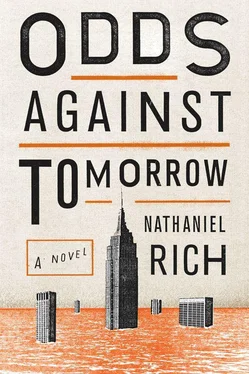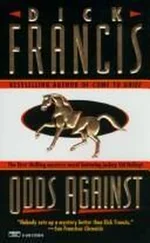Mitchell Zukor was missing.
The condition of the atrium was the first indication that something was wrong. The atrium was immaculate. Last month it had still resembled a forgotten storage unit, with disorderly clusters of tools, chairs, and bank-teller desks, long sacks of fertilizer and compost, and pallets from Jackpot loaded with vegetable cans and packages of instant ramen. The red travertine floor tiles had been all but obscured by dirt and plastic wrappers and what appeared to be animal droppings. Mitchell’s appearance then had alarmed her; he had not looked good. He hadn’t shaved since, well, probably not since Randall’s Island. Gone was the Mexicano; this was the Elderly Wino. She could barely recognize him. The most disturbing thing was the beard. It was full and wild, getting into the corners of his mouth, and it was coming in white. Now he really looked the part of a mad old oracle, she told them back at the office. Like Tiresias himself, frail and muttering and blind.
It was a slight exaggeration. Mitchell wasn’t frail. Far from it, in fact, he was broader in his shoulders and neck — his body, in a state of shock, frantically adding muscle to cope with the intense physical exertions it had been forced to endure for the first time in its existence. And Mitchell wasn’t blind either, except in one respect: he had no idea what he looked like, not having glimpsed a reflective surface for six months other than the rippled, silty waters of the Fresh Creek Basin. When she mentioned the whiteness of his beard, he had no idea what she was talking about, and when she clarified it for him, he just shrugged. He didn’t seem to care. His clothes were filthy too. He cleaned them every few weeks in the marsh, he reported, as if this achievement were worthy of a trophy. Gold star for marsh boy.
So in addition to the other supplies he had requested and several that he had not, she had brought him a gift: a mirror. She’d had it wrapped in brown paper, tied with a red bow. She carried it to the door, leaving the rest of the things — the floor wax, the new pack of filtration cartridges, the fresh vegetables — in the truck. He didn’t answer the intercom at the front gate, which was typical, so she punched the security code, passed through the arbor, and unbolted the front door with her key. But now, upon entering the old bank building, she was so disturbed by what she saw that she lost her grip on the mirror. She clamped down as it fell, pinning it against the side of her knee just before it hit the floor.
“Mitchell?” she called out. “It’s me.”
The supplies were still there — they had barely been dented — but he had stacked them neatly in the bays along either side of the atrium, behind the U-shaped bank that in a distant age had separated the bank customers from the tellers. The floor had been mopped clean, the travertine tiles glowing dimly in the twin shafts of sunlight that passed through the two first-floor windows. Emptied of the clutter, the room somehow seemed taller, and she was astonished to see that the original lighting fixtures — twin domes hanging at the end of white stalks like the eyes of a hermit crab — had been polished to their original splendor. There were no lightbulbs in them, of course, but still the glass globes absorbed the light that bounced off the floor, projecting solar systems on the walls.
She first checked the vault — if Mitchell was inside, he might not have heard her enter. The door gave with a startled gasp, revealing its treasures: the portable generator, the canisters of gasoline, another half dozen pallets of canned vegetables, about a hundred gallons of water, and the black suitcase that she figured must by now contain nearly half a million dollars in rubber-banded stacks of hundreds. Everything seemed in order. There was no sign of a break-in. But there was also no sign of Mitchell.
On the second floor he had shelved the books she had brought him, and the couches had been arranged around the center of the room. A stack of books lay on the low coffee table in front of the couch. The thick volume resting on top was titled Textbook of Domicilic Engineering: Systems and Processes .
“Mitchell?”
Her voice came out strangled. Every time she visited she was reminded how ridiculous it was to leave him here like this, in isolation. But what else could she do? He’d refused every alternative. Even her offer of a cabin on the Maine coast, off the grid, outfitted with the latest in bioenergy technology, with a full garden already planted — even that he had refused with a scornful head shake.
“That’s not the point,” he’d said cryptically. He’d developed a disquieting habit of combing his fingers through his beard, where they inevitably found little pieces of fuzz or food that he held up to his eyes for examination before tossing aside. “I have to do it by myself, for myself.” He refused to say anything else on the subject.
On the third floor his sleeping bag was unrolled. His clothes were piled tidily on the conference table. The desk he kept by the windows was the only messy thing in the place: scattered papers, pencils, a calculator, and open books on electric engineering and building design, their pages heavily annotated. It could not look more different from his FutureWorld office. This room felt lived-in, thought-in, alive with knowledge. At FutureWorld the offices had felt choked by knowledge — choked to death.
On the tall windows he had done a near-professional job: the putty was almost invisible at the edges of the new panes, the glass unsmudged. The weather monitor sat on the sill, its silicon dish exposed to the sunlight. She walked over and looked out. Mitchell wasn’t visible in the garden below, though the large, flat leaves of the canna plants, flapping in the breeze like pterodactyl wings, obscured part of it. Nor was he in the outhouse; she could see that the door was ajar. And she doubted he was in the marsh; he never left the property by daylight, as far as she knew. In any case there wasn’t anyone now visible in the marsh, except for the Motas and their young daughter. A fat white opossum was sauntering lazily down Flatlands Avenue. She hiccuped.
“Mitchell!”
She ran down the stairs, her hiking boots thwaping on the burnished stone steps. She had bought them upon returning to Manhattan — a six-hundred-dollar pair of black Mountainsiders with injection-molded supports, antibacterial linings, open-cell foam sock liners, and thick, chunky treads. It was a silly purchase: she wore them only during visits to the Flatlands, and even then they were hardly necessary. Still, the boots had become part of the monthly ritual. Going to the wilderness? Throw the heels into a bag, slip on the hiking boots. Then call the armored limousine. That was the other indispensable part of the ritual: the armored limousine, which was really closer to a cargo truck, with its giant trunk compartment, off-road wheels, and Large Keith, the 280-pound retired defensive end who served as her driver.
Outside, as she passed from the entryway to the front gate, something flashed in the garden behind the canna plants. Squinting, she ran to it, past the tomato trellises and some kind of purple lettuce, her boots kicking soil onto her calves. Was he playing games with her, hiding in the garden?
But no one was there. The glimmer was a shard of glass wedged into the boundary wall at shoulder height. It was attached to a cracked window frame, one of the thousands of pieces of debris that formed the wall to Mitchell’s fortress, nearly every component with rough surfaces and jagged edges. You couldn’t climb a wall like that — you couldn’t even touch it. That seemed to be the point.
Sweet jumping Jesus, get me out of here.
Читать дальше












